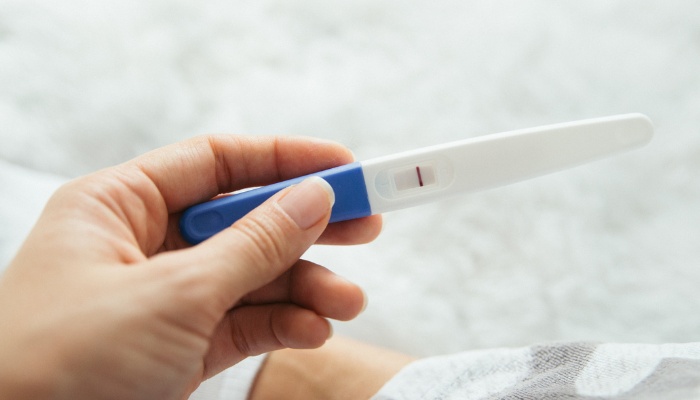The phenomenon of the hook effect happens during pregnancy when there is an excessive amount of hCG present in the body, causing the pregnancy test to be unreliable and produce a false negative result.
Though hook effect results are rare, they can happen.
If you suspect that a hook effect caused your negative result, try diluting your urine with water to reduce the concentration of hCG before testing again.
Forbes Health explains:
“When there is too much hCG, the elevated levels of the hormone can essentially overwhelm the test, causing it to produce a false negative. This is referred to as the ‘hook effect.’
The hook effect tends to happen further along in pregnancy, when levels of hCG increase.”
Table of Contents
Hook Effect PregnancyTest
A hook effect pregnancy test occurs when you are pregnant but get a false negative reading on a test. This can happen with blood or urine tests.
Your body contains too much of the exact substance the pregnancy test is trying to detect, so the test doesn’t work properly.
It’s confusing because human chorionic gonadotropin, better known as hCG, is the pregnancy hormone needed to prove you are pregnant, but too much can give you the opposite reading.
Why It Occurs
If your blood or urine contains too much hCG, the pregnancy test may not produce accurate results because the antibodies the test uses are basically overwhelmed and unable to bind to the hormone as intended.
In the early stages of pregnancy, when hCG levels are rising, a pregnancy test works by detecting the presence of hCG in the urine sample.
The test line becomes visible when hCG is present, confirming pregnancy.
However, if the concentration of hCG is extremely high, it can overwhelm the binding sites on the antibodies used in the test.
As a result, the antibodies may become saturated, and the excess hCG molecules may not bind effectively with them.
This saturation or interference can lead to a false-negative result because the test line does not appear as expected, even though the woman is pregnant.
Essentially, the hook effect can cause the test to underestimate the concentration of hCG in the sample, leading to an incorrect interpretation of the result.
Chances of Experiencing the Hook Effect
If your hCG level is over 500,000 mIU/mL, a hook effect pregnancy test could occur, but remember that this is rare.
The chances of experiencing a hook effect with a pregnancy test are between .2 and 2 percent.
It’s more common for a twin pregnancy to lead to the hook effect, but it’s still extremely rare. The chances still remain less than 3%.
As you can see in the chart below, even twin pregnancies don’t typically come close to hCG levels of 500,000 mIU/mL.
| Weeks of pregnancy | HCG levels single pregnancy (mIU/mL) | HCG levels twin pregnancy (mIU/mL) |
|---|---|---|
| 3 | 0 to 50 | 5 to 120 |
| 4 | 5 to 430 | 200 to 1,800 |
| 5 | 180 – 7,400 | 2,400 to 36,000 |
| 6 | 1,100 to 56,500 | 8,700 to 108,000 |
| 7-8 | 7,600 to 230,000 | 7,650 to 288,000 |
| 9-12 | 25,300 to 290,000 | 348,000 to 480,000 |
| 13-16 | 14,000 to 243,000 | 180,000 to 348,000 |
| 17-24 | 4,000 to 165,000 | 8,000 to 165,000 |
| 25-40 | 3,200 to 90,000 | 3,600 to 117,000 |
How To Know if You’re Experiencing the Hook Effect
If you are showing typical pregnancy symptoms but continuing to get negative test results, you may be experiencing the hook effect.
An ultrasound may be the only way to confirm your pregnancy.
It’s very important to clarify whether or not you are indeed pregnant.
If a hook effect leads you to believe that you are not pregnant, you might undergo x-rays or other procedures that could harm your baby or continue to consume alcohol, smoke, or abuse drugs.
If you suspect that you are indeed pregnant, please see your doctor for confirmation and prenatal care if needed.
How To Avoid a Hook Effect Pregnancy Test
Try to avoid a hook effect pregnancy test by practicing the following:
- Dilute your urine before testing. While this is not usually recommended, it can help you if you’re dealing with a hook effect test because it will lower your hCG levels and reduce the overwhelming effect on the test.
- Take a pregnancy test later in the day. Your hCG levels should be lower later in the day, so the test will pick them up without having any issues.
Home Pregnancy Test Accuracy
Home pregnancy tests are easy and convenient, but they aren’t all created equally.
Though some claim to be almost 100 percent accurate, there is always room for error.
That’s why many people buy more than one and take several when they miss a period.
The Odds of Having a False Negative Pregnancy Test
False negative pregnancy test results are not common. In fact, there’s less than a 1% chance of getting a false negative test.
However, you do need to ensure you take the test at the right time so it can pick up the hCG hormone, and you need to follow the instructions given for the test.

False Negative Pregnancy Test Causes
There are several reasons you could be getting a false negative test besides the hook effect issue. Knowing what they are can help you avoid common mistakes.
1. Taking the Test Too Early
When you’re trying to get pregnant, it’s normal to want to test the minute you think a test might come back positive.
However, testing too early can give you a false negative with some tests. Wait until the day your test recommends for best results.
2. Not Taking the Test Correctly
Pregnancy tests come with pretty detailed instructions, but not everyone follows them.
You need to make sure to take the test properly and to read the results within the time frame recommended.
3. Urine Too Diluted
Most doctors recommend taking a pregnancy test first thing in the morning so you get the least diluted urine of the day.
If you drink too much water or wait until too late in the day, a pregnancy test may not be able to pick up enough of the hCG hormone to read positive.
4. Not Reading Results Within the Given Time Frame
It’s stressful to wait for your pregnancy test to be ready to read, but don’t just walk off and leave it without setting a timer.
You need to read the results during the given time frame so you can accurately see what they are.
5. Ectopic Pregnancy
An ectopic pregnancy can cause a false negative, and this can be dangerous.
You need to seek treatment if you are experiencing an ectopic pregnancy, so follow up with your doctor if you think you’re pregnant but can’t get a positive result.
6. Certain Medications
Medications such as promethazine and benzodiazepines can cause inaccuracy in pregnancy test results.
Make sure your doctor knows what medication you are on so they can help you determine if it is interfering with test results.
7. Pregnant With Multiples
Being pregnant with twins, triplets, or more can cause a false negative pregnancy test.
The reasoning is simple: the hCG hormone is higher when you’re pregnant with multiples, so you could experience the hook effect due to the overload of the hormone in your urine or blood.
Kristy is the mother of four, including identical twins. With a background in education and research, she is constantly learning more about parenting and raising multiples. When she has spare time, she enjoys hiking into the woods with a great book to take a break.

